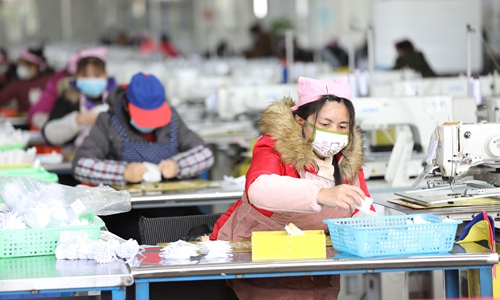
Workers start manufacturing at a shoe factory in Central China’s Hunan Province on Monday. Workers are required to wear masks and measure their body temperatures twice a day. Photo: cnsphoto
Top Chinese officials are focusing more attention on stabilizing the jobs market and are calling for intensified measures to circumvent potential mass layoffs as a result of the outbreak of the deadly coronavirus, as concerns of rising unemployment deepen due to both the epidemic and efforts to combat it.
On Wednesday, meetings of two of the country's highest decision-making bodies highlighted the importance of ensuring a stable jobs market and avoiding mass layoffs. A meeting of the Standing Committee of the Political Bureau of the Communist Party of China Central Committee urged intensified efforts to implement pro-employment policies and to ensure a resilient overall jobs market.
Specifically, the meeting called for improved fiscal, financial and social security policies to support small and medium-sized enterprises (SMEs) and help state-owned companies resume production, according to the Xinhua News Agency.
Also, on the same day, an executive meeting of the State Council, China's cabinet, sought to shift more focus on employment. The meeting demanded a "high-level of attention on employment issues and avoiding large layoffs," according to a statement released after the meeting.
The meeting also encouraged local governments to use unemployment insurance funds to step up support for employers and stabilize employment and guide rural workers who are stuck at home due to the epidemic to work in infrastructure projects in rural areas, the statement said.
The meetings underscored rising urgency among top officials to stabilize employment and prevent layoffs - two critical matters pertaining to not only the economy but the whole society, said Cao Heping, a professor of economics at Peking University in Beijing.
"These are the types of problems that could be more dangerous than the virus itself because they are about social stability," Cao told the Global Times on Wednesday, adding that the meetings showed that "top officials already have a contingency plan in place."
Stabilizing employment has been a top priority for Chinese policymakers in recent years, as the world's second-largest economy faces persistent downward pressure due to a profound industrial upgrade process and a deteriorating external environment.
Under a slew of supportive policies, China added 13.52 million urban jobs in 2019 and kept the unemployment rate at a relatively low level of 3.62 percent, according to the Ministry of Human Resources and Social Security.
However, the epidemic of the deadly coronavirus which has brought the country to a near standstill, as well as vigorous efforts by officials across the country to stop the outbreak have put extra pressure on the jobs market, according to Cao.
"It's not just the virus itself, the battle against the virus has also created tremendous challenges for companies to resume operations and workers to restart work," Cao said, urging officials to not pursue a "one-size-fits-all" approach in their efforts to contain the virus.
"In areas where the epidemic is serious, we should take robust measures, but in other areas we should be more flexible and allow businesses to return to production as soon as possible."
Even as the battle against the epidemic continues across the country, officials have been helping businesses and factories resume operations in recent days, offering policy support in a wide range of areas from tax reduction to financial boosts.
Apart from workers, who have been trapped at home and could lose their jobs if their employers were forced to go into bankruptcy, there are millions of newcomers who will join the jobs market later this year.
In 2020, there is a total of 8.74 million college graduates, up 400,000 from last year, who will enter the labor market, according to Wang Hui, a senior official at the Ministry of Education.
"We expect the employment of higher education graduates will be more complicated and severe," Wang said, adding that the ministry has put in place plans to help newly graduates find jobs.


